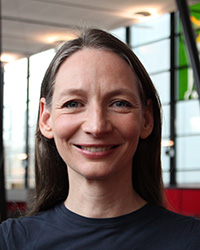Profile
Cleo received her PhD in Biological Sciences from University College London in 2001. She then spent four years as a MRC Career Development Fellow in the laboratory of Prof. Chris Higgins at the MRC Clinical Sciences Centre (now the London Institute of Medical Sciences), Imperial College London, where she developed a keen interest in cancer biology.
In 2006, she moved to the Blizard Institute to pursue her interest in senescence and cancer, spending four years in the laboratory of Prof. David Beach (FRS). During this time, she established our Phenotypic Screening facility, and has used this technology to discover novel regulators of the ageing and senescence biomarker, p16.
In 2010, Cleo was awarded a Lectureship, promoted to Senior Lecturer in 2016, to Reader in Senescence in 2020, and to Professor in 2022. She held the post of Director of Graduate Studies for the Blizard Institute from January 2018 – October 2021.
Cleo is the Director of The QMUL Phenotypic Screening Facility, managed by Dr Luke Gammon, and in 2018 became the Director of Graduate Studies for the Blizard Institute.
She also organises our cross-campus forums on ‘Senescence and Ageing’ and ‘Extracellular Vesicles’, and our award winning widening participation scheme, Blizard STARS.
LinkedIn profile
Research
Research Interests:
Our current research interests in Senescence
Cleo’s group uses high-throughput screening and 2D/3D in vitro models to illuminate senescence mechanisms, understand how cells age, explore the interplay between healthy ageing and cellular rejuvenation, and target senescence for ageing and cancer therapy.
Ageing
Advanced age is the main risk factor for most chronic diseases in humans, but the basic machinery that drives ageing remains largely unknown. Senescence is one of the nine hallmarks of ageing and targeting cellular senescence represents an exciting strategy for promoting healthy ageing. Our ageing team are interested in:
- understanding the fundamental mechanisms that underpin this complex and often context dependent cellular programme;
- finding novel routes to cellular rejuvenation;
- exploring how senescence underpins ageing phenotypes; and
- discovery novel senostatic and senolytic approaches for healthy ageing.
Cancer
Senescence also acts as an important tumour suppressor mechanism in cancers such as breast cancer. Pro-senescence therapy is an exciting new approach to activate a stable cell cycle arrest to halt tumour growth and expose cancers to novel treatment regimes. Our cancer team is investigating:
- how cells sense early carcinogenic events;
- the cellular mechanisms by which senescence could be selectively triggered in breast cancer;
- new genetic targets for pro-senescence therapy; and
- novel senostatic and senolytic approaches for cancer therapy.
We are always interested in hearing from bright, motivated scientists who are interested in joining our team.
Group Members
Staff
- Dr Ryan Wallis
- Dr Anna Kowala
- Dr Luke McIlvenna
PhD Students
- Bethany Hughes (BBSRC iCASE)
- Emily O’Sullivan (MRC DTP)
- Metka Gorkic (BBSRC iCASE)
- Federica Mossa (BBSRC LIDo)
Screening Facility Staff
Collaborative Grants
- Bethany Cuttings (Prof. Martin Knight, starting October 2021)
Alumni
- Dr Paul Braker (Barts Charity)Dr Madeleine Moore (MRC)
- Dr Eleanor Tyler (MRC; BBSRC LINK)
- Dr Deborah Milligan (BBSRC iCASE)
- Dr Ugochim (Stefany) Eduputa (BBSRC LIDo)
- Dr Matthew Bentham (QMUL Innovation Award)
- Andrew White (Unilever)
- Dr Hannah Mizen (BBSRC LIDo iCASE)
- James Newman (iBSc, SSC4)
MSc/MRes
- Alexander Baxendale
- Klaudia Rodi
- Arturo Robles
- Daniel Yee
- Mateja Sborchia
